#Collected Poems of T.S. Eliot
Photo

Collected Poems of T.S. Eliot
#Collected Poems of T.S. Eliot#ts eliot#t.s. eliot#poetry#poems#book#books#classic#icon#hero#thomas stearns eliot
39 notes
·
View notes
Text

T. S. Eliot, from “Collected Poems: 1909-1962; The Waste Land”, originally published c. 1963.
15 notes
·
View notes
Text
A Cooking Egg
by T.S. Eliot
En l'an trentiesme de mon aage
Que toutes mes hontes j'ay beues …
Pipit sate upright in her chair
Some distance from where I was sitting;
Views of the Oxford Colleges
Lay on the table, with the knitting.
Daguerreotypes and silhouettes,
Her grandfather and great great aunts,
Supported on the mantelpiece
An Invitation to the Dance.
. . . . .
I shall not want Honour in Heaven
For I shall meet Sir Philip Sidney
And have talk with Coriolanus
And other heroes of that kidney.
I shall not want Capital in Heaven
For I shall meet Sir Alfred Mond:
We two shall lie together, lapt
In a five per cent Exchequer Bond.
I shall not want Society in Heaven,
Lucretia Borgia shall be my Bride;
Her anecdotes will be more amusing
Than Pipit's experience could provide.
I shall not want Pipit in Heaven:
Madame Blavatsky will instruct me
In the Seven Sacred Trances;
Piccarda de Donati will conduct me …
But where is the penny world I bought
To eat with Pipit behind the screen?
The red-eyed scavengers are creeping
From Kentish Town and Golder's Green;
Where are the eagles and the trumpets?
Buried beneath some snow-deep Alps.
Over buttered scones and crumpets
Weeping, weeping multitudes
Droop in a hundred A.B.C.'s
#i linked to the annotations in the title#this poem is in the same collection as prufrock but isn’t as well known#it's a shame because i could talk about it for hours#once you've read and explicated it within a framework of literary & historical & biographical context you can have fun interpreting it#sometimes i'll read it with trans goggles on#works like syncing dark side of the moon to the wizard of oz#it's not just about the title--the narrator is somebody who is indefinitely postponing transition. the inanity of hatching into a dull bird#he is assuring himself that when he dies none of it will matter. he won't feel ugly or lonely or bored or stupid#but the dismissal of pipit and her simplicity pivots into the bittersweet realization that he's given her up for nothing.#that he was happiest before he came to think of her as vulgar & resented himself for wanting her#the world will end all the same and all he'll ever have is joylessness and the absence of pipit#t.s. eliot#poetry#i read much of the night and go south in the winter
14 notes
·
View notes
Text
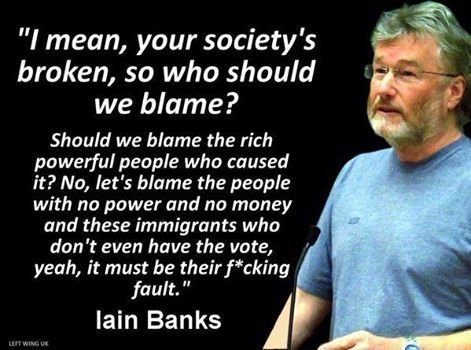
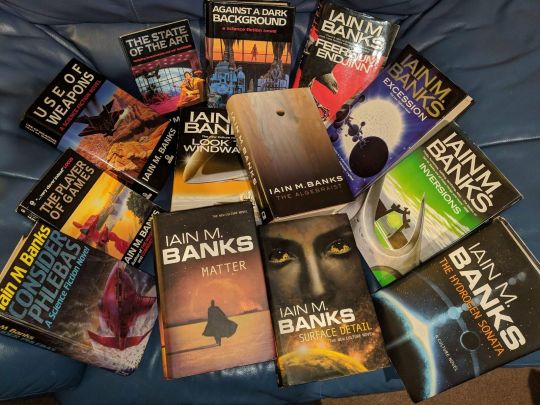
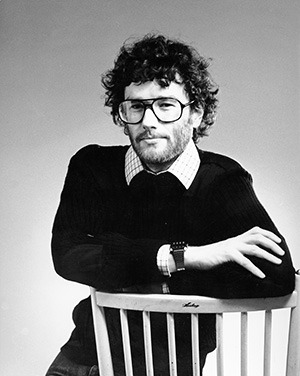
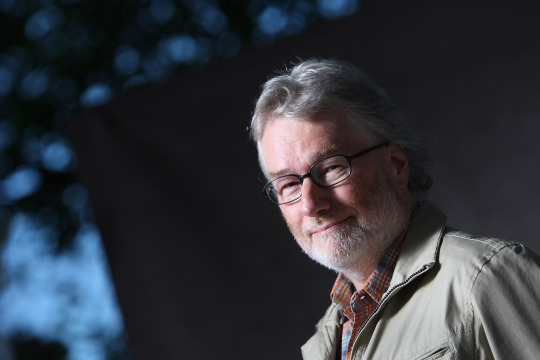
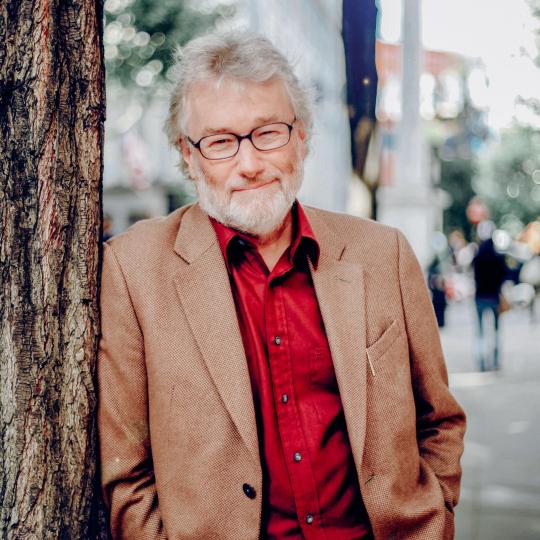
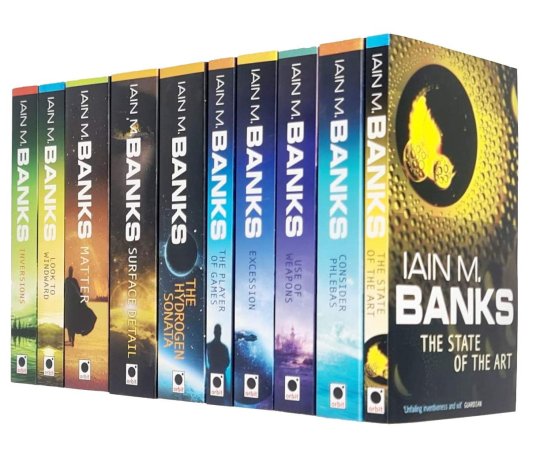
On February 16th 1954 the writer Iain Banks was born in Dunfermline, Fife
Banks was a son of a professional ice skater and an Admiralty officer. He spent his early years in North Queensferry and later moved to Gourock because of his father’s work requirement. He received his early education from Gourock and Greenock High Schools and at the young age of eleven, he decided to pursue a career in writing. He penned his first novel, titled The Hungarian Lift-Jet, in his adolescence. He was then enrolled at the University of Stirling where he studied English, philosophy and psychology. During his freshman year, he wrote his second novel, TTR.
Subsequent to attaining his bachelor degree, Banks worked a succession of jobs that allowed him some free time to write. The assortment of employments supported him financially throughout his twenties. He even managed to travel through Europe, North America and Scandinavia during which he was employed as an analyzer for IBM, a technician and a costing clerk in a London law firm. At the age of thirty he finally had his big break as he published his debut novel, The Wasp Factory, in 1984, henceforth he embraced full-time writing. It is considered to be one of the most inspiring teenage novels. The instant success of the book restored his confidence as a writer and that’s when he took up science fiction writing.
In 1987, he published his first sci-fi novel, Consider Phlebas which is a space opera. The title is inspired by one of the lines in T.S Eliot’s classic poem, The Waste Land. The novel is set in a fictional interstellar anarchist-socialist utopian society, named the Culture. The focus of the book is the ongoing war between Culture and Idiran Empire which the author manifests through the microcosm conflicts. The protagonist, Bora Horza Gobuchul, unlike other stereotypical heroes is portrayed as a morally ambiguous individual, who appeals to the readers. Additionally, the grand scenery and use of variety of literary devices add up to the extremely well reception of the book. Its sequel, The Player of Games, came out the very next year which paved way for other seven volumes in The Culture series.
Besides the Culture series, Banks wrote several stand-alone novels. Some of them were adapted for television, radio and theatre. BBC television adapted his novel, The Crow Road (1992), and BBC Radio 4 broadcasted Espedair Street. The literary influences on his works include Isaac Asimov, Dan Simmons, Arthur C. Clarke, and M. John Harrison. He was featured in a television documentary, The Strange Worlds of Iain Banks South Bank Show, which discussed his literary writings. In 2003, he published a non-fiction book, Raw Spirit, which is a travelogue of Scotland. Banks last novel, titled The Quarry, appeared posthumously. He also penned a collection of poetry but could not publish it in his lifetime. It is expected to be released in 2015. He was awarded multitude of titles and accolades in honour of his contribution to literature. Some of these accolades include British Science Fiction Association Award, Arthur C. Clarke Award, Locus Poll Award, Prometheus Award and Hugo Award.
Iain Banks was diagnosed with terminal cancer of the gallbladder and died at the age of 59 in the summer of 2013.
315 notes
·
View notes
Note
hi hi hi ceil! I hope you're doing well. My new year's resolution is to read more books, and I was just wondering if there were any you would rec? I really enjoy the stuff you right, and wondered where you get the inspiration from
hi hi!!!! im doing great actually, i had a nice day :))
oh i have SO many!! these are just my personal favourite and i read a lot of literary fiction and non-fiction and 'weird' lit, so hopefully something on this list sounds fun to you:
glass, irony, and god by anne carson [poetry - although i would recommend absolutely anything by anne carson]
half-light: collected poems 1965-2016 by frank bidart [poetry - honestly one of the poets you MUST read if you love poetry in my opinion - bidart, carson, dionne brand, louise gluck, paul celan, maggie nelson, adrienne rich, rainer maria rilke, t.s eliot, jan zwicky, kahlil gibran]
rings of saturn by w.g. sebald [literary fiction - unnamed narrator takes a walking tour of suffolk, england, and the book is about the encoded meaning found in everything; i love sebald so so much]
house of leaves by mark danielewski [architectural / weird horror; cult classic; spooky and eerie in the best way; high concept, a bit complicated to follow but worth it]
drive your plow over the bones of the dead by olga tokarczuk [fiction / thriller, a bit - read this last month and this book hooked me oh my god, it was so good]
severance by ling ma [apocalyptic / post-apocalyptic - possibly one of my fave books in this genre]
the overstory by richard powers [environmental fiction - multiple different narratives that sometimes converge, sometimes don't; truly had me weepy at points] (also, if you like environmental books, the golden spruce by john vaillant)
the complete cosmicomics by italo calvino [strange literary fiction, short stories - oh these are so delightfully strange and zippy and weird, they feel like eating starbursts or something!!!]
underland by robert macfarlane [non-fiction - this consumed me for days when i read oh my god. all about underground structures, catacombs, caves and caving, mines, radioactive waste disposal, etc]
the lonely city by olivia laing [non-fiction - a sad book, but still hopeful; she has such insightful commentary on art and queer history too]
the library at mount char by scott hawkins [weird fiction - so cool, SUCH a cool fun book oh my god. very interesting premise and executed to perfection]
some other names i'd recommend: eileen myles, maggie nelson, rebecca solnit, and ursula k. leguin (for your scifi/fantasy needs)
122 notes
·
View notes
Text
Paris: A Year Abroad in a short film
Audio: "Burnt Norton" by Lana Del Rey, a rendition of the original poem "Burnt Norton" by T.S. Eliot.
Where do I even start? Paris has wholly shaped me in ways I never imagined. We refer to Paris as the city of love, but I'm now more inclined to call it the city of art - which only leaves more room for love in your heart. There is so much to contemplate and appreciate in frequenting the vast array of art museums here - from the Louvre, Musée d’Orsay, Musée de l’Orangerie, the Centre Georges Pompidou, and many more. Not only has my perspective on art expanded, but so has my worldview. That’s because art is truly everywhere in this city; art can be found in the walkable streets amidst the rich architecture, the fashionable outfits seen in daily life, and even the exquisite decor in stores and when you cheekily peek into Parisian appartments!
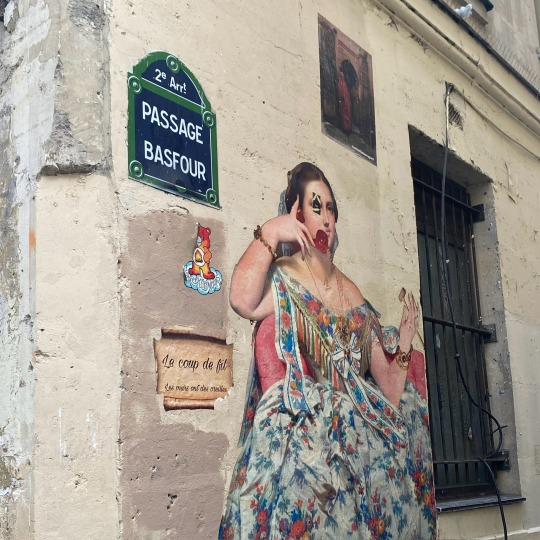
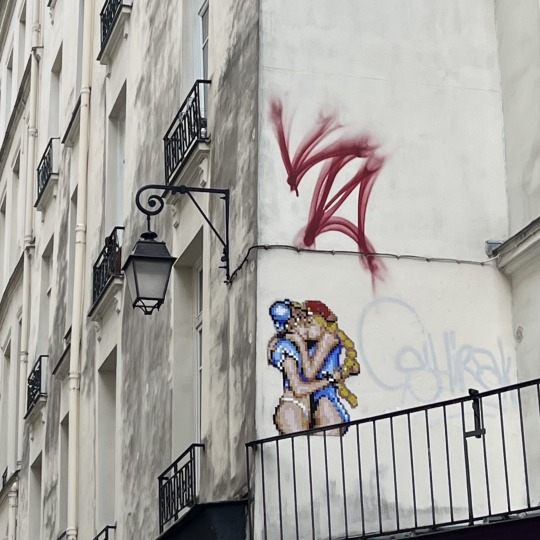
There's always something new to discover in Paris, I'm almost saddened at the thought of the things I've yet to discover or missed. The treasures to unveil in Paris move far beyond the typical tourist hotspots we all know and love. I am obsessed with Parisian boutiques; they are chic and unique (that unintentionally rhymed) in the best way possible. One of my favourites is La Tonkinoise à Paris, located in the 11th arrondissement. This particular arrondissmenet is the best in Paris to be honest, it holds a special place in my heart as I had the wonderful opportunity of living there, so perhaps you can say that I am somewhat biased. Still, I can confidently say that this animated, hip and creative neighbourhood is one everyone should have the chance to explore.
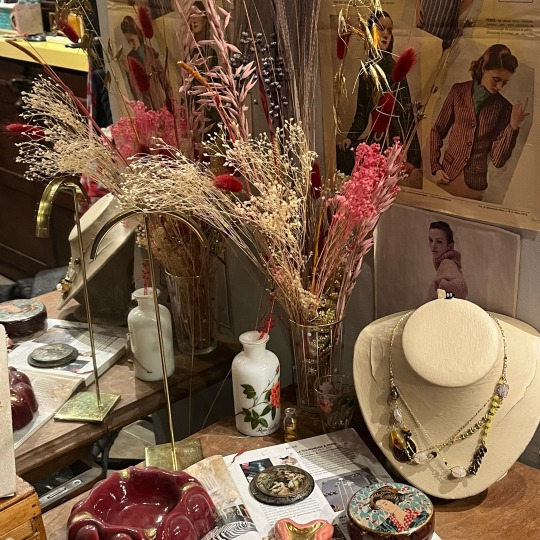
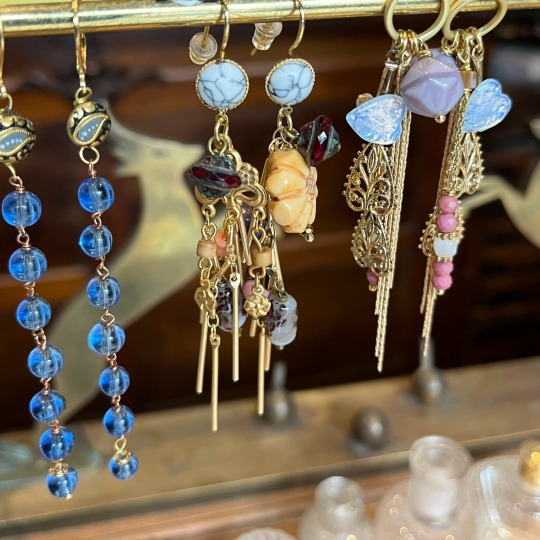
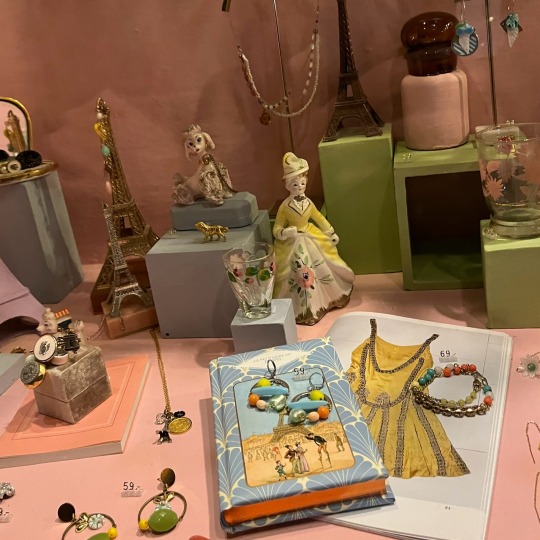
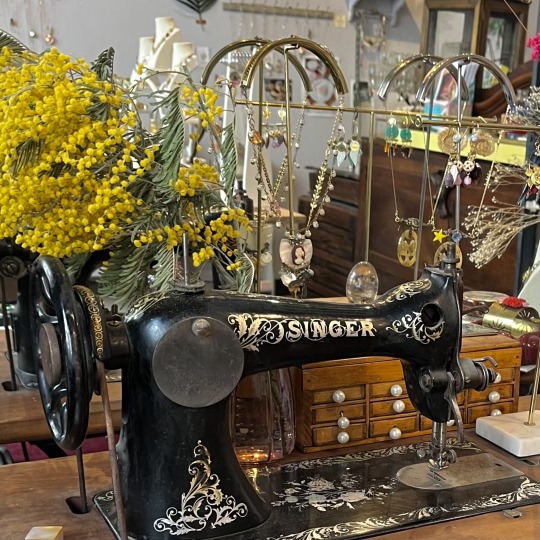
La Tonkinoise à Paris, owned by the lovely Chantal, is my favourite hidden gem in Paris. I had the pleasure of befriending Chantal as I ended up frequenting her store one too many times; I've garnered quite a collection over time. This boutique offers a wide range of eccentric and sustainable jewellery, with her earring creations being the show stoppers, in my opinion. Her jewellery is composed of rings, pearls, brooches, charms, and watches, all unearthed in flea markets and recycled. I love that every piece of jewellery indeed is a unique piece. The decor changes based on the season and theme of her new collections, making it an ever-changing and exciting shopping experience. This is honestly the best jewellery store I have ever been to in my life! I wish the pictures I took could do the jewellery and the boutique's decor justice, but it simply won't, I'm afraid.

Now, onto food, I genuinely need to figure out where to start here. My favourite authentic French restaurant would have to be 'Le Potager du Père Thierry', located in Montmartre. Although it's incredibly small, I love the cosy vibe; I feel like I can enjoy delicious food with friends without feeling surrounded by strangers. Surprisingly, it's also very quiet (yet packed) - I guess the food is just too distracting.
As of late, my favourite non-french restaurant has to be 'Big Black Cook' (let's ignore how inappropriate that pun is, though funny). It's located in the 2nd arrondissement and serves Caribbean food, my friend claims that it was the best meat she's had!
For brunch, I recommend Café Méricourt in the 11th arrondissement. Their green Eggs & Feta are absolutely incredible and quite innovative as far as brunch places go.
As for a boulangerie - seriously, anywhere, literally anywhere in Paris, go to your nearest bakery; there need not be a big fuss - you're in for a scrumptious baked treat regardless!

I'm ever so grateful for the chance to have lived in Paris for an extended period; you cannot appreciate Paris in its entire splendour from a mere short-term visit. The city is an actual work of art; art is everywhere in the city, from the street performers and musicians, the light filters through the trees, the city's many architecturally rich bridges, the picturesque cafés and boulangeries, the beautifully presented food, the way that the city's many different neighbourhoods each have their own distinct character and vibe. In Paris, art is everywhere.
#paris#short film#year abroad#france#travel#paris france#lana del rey#burnt norton#my film#film#fragments#memoirs#art#french art#boutiqueshopping#arrondissement#architecture#interior design#decor#decoration#parisian style#fashion#tour eiffel#montmartre#street art#parisian#louvre#musee d'orsay#french food#foodie
69 notes
·
View notes
Note
recently went to a nearby used bookstore that had an extensive poetry section that i looked through but can’t find anything that really click with me. i know you already post poem recs (which are super helpful and appreciated!!) i was just wondering if there are any poetry book/collection that you would give to someone new to poetry as an introduction of some sort?
hi yeah of course! i have made a few rec lists in the past which i will link, but if you're kinda new to poetry id recommend starting with something along the lines of Natalie Diaz, Paige Lewis, Kaveh Akbar or Chen Chen. don't immediately go for the collected works but start small.
(Averno by Glück could be a nice way in. the book tells the story of persephone and demeter. the whole thing builds gradually, it borrows lines from earlier poems and it has a very satisfying conclusion. one of my first real poetry loves.)
i am currently going through a Carl Phillips phase, so you could join me in that if you like. i've also recently discovered and fallen in love w Eve L. Ewing's work and i know Richard Siken's Crush got a lot of people into poetry, so that could be places to start!
some links:
fave poets
poetry books
dog poems specifically
hockey poetry recs
a collection of poems i love just in general
i got started on making my edits sortable by poet but couldn't really figure out a good way of making that work (too many links for one post rip). the idea is that if you like a poem, maybe see whether there's anything else by that poet & maybe you'll like that too. if you like several of this poet's poems maybe its worth looking into buying one of their books :)
general rule of thumb: the modern stuff is easier to get into. the old shit also rocks ofc, but maybe build up to some of that if you find that Byron etc doesn't immediately resonate. if you want to start reading names your mom will recognise: try T.S. Eliot
and if all else fails: padraig
#Hanif Abdurraqib honourable mention#Traci Brimhall#agh I could go forever and it'll be less & less helpful because there is SO MUCH that's good and pretty beginner friendly and I dont want t#overwhelm you with options#if you find something you like please come back and let me know I love talking poetry
22 notes
·
View notes
Text
In this deeply intimate second poetry collection, Ocean Vuong searches for life among the aftershocks of his mother's death, embodying the paradox of sitting within grief while being determined to survive beyond it. Shifting through memory, and in concert with the themes of his novel On Earth We're Briefly Gorgeous, Vuong contends with personal loss, the meaning of family, and the cost of being the product of an American war in America. At once vivid, brave, and propulsive, Vuong's poems circle fragmented lives to find both restoration as well as the epicenter of the break.
The author of the critically acclaimed poetry collection Night Sky With Exit Wounds, winner of the 2016 Whiting Award, the 2017 T.S. Eliot Prize, and a 2019 MacArthur fellow, Vuong writes directly to our humanity without losing sight of the current moment. These poems represent a more innovative and daring experimentation with language and form, illuminating how the themes we perennially live in and question are truly inexhaustible. Bold and prescient, and a testament to tenderness in the face of violence, Time Is a Mother is a return and a forging forth all at once.
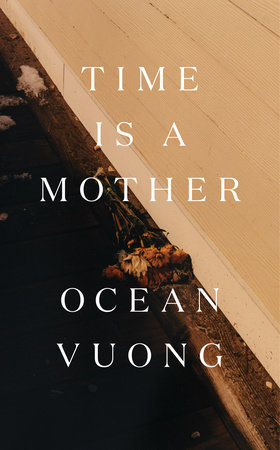
7 notes
·
View notes
Text
The Pete McVries Reading List
so McVries is a big reader. I collected some books by the authors he mentioned into a reading list. They are chronological by publication date and go up to 1979. If I missed any authors he mentioned in other parts of the book, let me know & I will update.
The Catcher in the Rye (1951) - J.D. Salinger
Nine Stories (1953) - J.D. Salinger
A Separate Peace (1959) - John Knowles
Franny and Zooey (1961) - J.D. Salinger
There Must Be a Pony! (1961) - James Kirkwood
Morning in Antibes (1962)- John Knowles
Raise High the Roof Beam, Carpenters and Seymour: An Introduction (1963) - J.D. Salinger
U.T.B.U. (Unhealthy To Be Unpleasant), (Play, 1965)- James Kirkwood
Indian Summer (1966) - John Knowles
Phineas; Six Stories (1968) - John Knowles
Good Times/Bad Times (1968) - James Kirkwood
The Paragon (1971) - John Knowles
P.S. Your Cat Is Dead (1972) - James Kirkwood
Spreading Fires (1974) - John Knowles
Some Kind of Hero (1975) - James Kirkwood
A Chorus Line (co-authored with Nicholas Dante), (Play/Musical, 1975) - James Kirkwood
Hard Feelings (1977) - Don Bredes
A Vein Of Riches (1978) - John Knowles
Poetry of John Keats
Poetry of Algernon Charles Swinburne
and because I am a huge nerd I put a list of books that I would recommend to McVries under the cut
My recommendations to McVries:
Demian - Hermann Hesse
Beneath The Wheel - Hermann Hesse
This Side of Paradise - F. Scott Fitzgerald
Breakfast of Champions - Kurt Vonnegut. Actually not entirely sure he'd like Vonnegut but I'd recommend it based on his worldview.
The Stranger - Albert Camus
Jane Eyre - Charlotte Brontë. Actually sure throw in Wuthering Heights by Emily Brontë too Pete seems like someone who wuthers
Portrait of the Artist as a Young Man - James Joyce
The Poems of Sylvia Plath
The Poems of T.S. Eliot
The Long Walk - Richard Bachman. I think he'd love that one
also I know it's ridiculous to put in A Chorus Line but it's simple logic. McVries likes James Kirkwood -> James Kirkwood co-wrote the book for A Chorus Line -> McVries likes A Chorus Line. this is the hill I have chosen to die on. It's canon. You will have to pry this from me after i'm rotting in my grave if you want me to relinquish this. Does McVries like musical theatre? I don't know. Who cares. Does he like A Chorus Line? Yes. Is this incredibly important to me because it's in my top 5 musicals? Yes. Okay thanks. anyway McVries and I would have been friends in high school
18 notes
·
View notes
Text
𝐨𝐧 𝐦.𝐰. 𝐬𝐭𝐚𝐫𝐫.
✩°。⋆🎧: star | 18 | she/her
— i am an english and sociology student from the united states, and this is my blog for everything poetry. some days i may share my own, and some days i may not. my poems are inspired by my loves, passions, and anything from my own life and heart. if you enjoy anything i share, please feel free to stick around.
my heart is for... → 90s grunge bands, dr. pepper, red flowers, the crow & many (many) other films, vampires, dogs, decades not my own, ballpoint pens, vinyl, my unnamed love
my poetic influences → romance-era poets, grunge music, edgar allan poe, t.s. eliot, layne staley, kurt cobain, hozier
my other hobbies → journaling, vinyl & cd collecting, watching movies, listening to music, playing piano & flute
please note that i do not follow from this blog.
18+ only, please.
#poetry blog#blog intro#meet the admin#intro post#pinned post#poets on tumblr#writers and poets#poetblr#grunge
3 notes
·
View notes
Text

T. S. Eliot, from “Collected Poems: 1909-1962; The Waste Land”, originally published c. 1963.
6 notes
·
View notes
Text
poetry flash fic game
ok since ao3’s down (and could be down for awhile, apparently), i wanna get some tumblr shorts going! i’ve listed out some poetry quotes i love below, so if you send me a ship (or a character – some of these really suit a character study imo) and a number i’ll write a little something! some of these quotes are from fav poems of mine, and some are just lines i thought would make good prompts :)
I am not cruel, just truthful – / The eye of a little god, four cornered. (Mirror, Sylvia Plath)
The dark collects our empties, empties our ashtrays. ([The dark collects…], Ben Lerner)
And this is the end, / the car running out of road (Aristotle, Billy Collins)
Being unwise enough to have married her / I never knew when she was not acting. (Acting, R.S. Thomas)
and this is the wonder that’s keeping the stars apart (i carry your heart with me, e.e. cummings)
We talk so much of light, please / let me speak on behalf / of the good dark. (How Dark the Beginning, Maggie Smith)
The art of losing isn’t hard to master (One Art, Elizabeth Bishop)
Did you mean “this could go on forever” in a good way? ([The dark collects…], Ben Lerner)
All day I tried to distinguish / need from desire. (Elms, Louise Glück)
I picture a figure in the act of reading, / shoes on a desk, head tilted into the wind of a book (Books, Billy Collins)
Pleasure / as a means, / and then a / means again / with no ends / in sight. (Peanut Butter, Eileen Myles)
But who is that on the other side of you? (The Waste Land, T.S. Eliot)
Love always wakes the dragon and suddenly / flames everywhere. (Litany in Which Certain Things Are Crossed Out, Richard Siken)
The moon is / predictably exquisite, as is the view of the moon through the word. ([The predictability of these rooms], Ben Lerner)
There is nothing more pathetic than caution / when headlong might save a life, / even, possibly, your own. (Moments, Mary Oliver)
To avoid the slow accrual of infatuation / Curdling into love / You just have to duck (Autocorrect, Noah Eli Gordon)
#can you guess who my favorite poets are#i assume you can#come play with me!#i love an opportunity for a little short fic#also pls tell me your favorite poets#i would like this info as well#mads number 13 is for youuuuuuuu#this was inspired by mads' siken game!#poetry flash fic game#ask game
10 notes
·
View notes
Photo

Heroic Polish Poet
Won the Nobel Prize
Polish writer Czeslaw Milosz protected Jews during the Holocaust, wrote poems that inspired millions, and advocated passionately for freedom of thought and human rights.
Czeslaw was born in 1911 to an illustrious family descended from Polish nobility. At the time of his birth, Poland was not an independent country and the Milosz clan lived in an area that was Russian Empire. He spent his early childhood on his grandfather’s estate, but when World War I broke out in 1914, the family was thrown into turmoil. Czeslaw’s father was drafted into the Russian army, and Czeslaw and his mother spent the next four years fleeing the Germans in (modern-day) Lithuania, Estonia and Latvia. When the war ended, the family settled in Vilna, a city with a significant Jewish population, known as a hub of exceptional Jewish scholars and yeshivas.
Exceptionally intelligent and curious, Czeslaw learned six languages (Polish, Lithuanian, Russian, English, French, and Hebrew.) He entered law school at the prestigious Stefan Batory University when he was only 18 years old, but found his true calling and talent in poetry. He published his first poems in the university magazine in 1930, and formed a student poetry group and an “Intellectuals Club.”
Czeslaw had many Jewish friends at the university, and was shocked when an antisemitic mob attacked Jew on campus. Czeslaw bravely stood up to the mob and protected the Jewish students. Sadly one student was killed when a large rock was thrown at his head.
The incident influenced Czeslaw’s writing, and he described his work as “Poetry of Protest.” While still a student, Czeslaw published his first volume of poetry After graduating from university, Czeslaw worked at a radio station in Vilna. He produced a wide range of programming for the station, including performances by Jewish musicians and writers. As Hitler rose to power, his hateful ideology took hold among many Lithuanian nationalists. Czeslaw’s showcasing Jewish voices on the radio led to an anonymous complaint falsely accusing him of fomenting communism, and he was fired.
Czeslaw moved back to Poland, now an independent republic, and worked at Polish Radio in Warsaw. He published another volume of poetry, which quickly gained acclaim among poetry-lovers and critics. He was compared to legendary 19th century Polish poet Adam Mickiewicz.
After Germany invaded Poland in 1939, Czeslaw became an active member of the Polish underground resistance. The Nazis persecuted Polish intellectuals and artists, and Czeslaw published his next book of poetry under a pseudonym, which he also used for his translations of Shakespeare and T.S. Eliot.
Horrified at the violent and vicious persecution of Jews in Warsaw, Czeslaw, along with his brother Andrzej, began helping Jews hide or escape from the Nazis. He defied the Nazis to help at least five Polish Jews and maybe more, providing them a place to hide as well as financial support. Czeslaw knew that the penalty for this transgression was death, but his moral compass did not allow him to stand idly by. In late 1944 Czeslaw was captured by the Germans and held in a prisoner transit camp. Miraculously, he was helped by a Catholic nun (and total stranger) who somehow convinced the Germans to let him go.
After the war, Czeslaw published his powerful fourth collection of poetry, focusing on the loss of three million Polish Jews, and the willful blindness of much of the Polish population. Came po dei Fiori, written in 1943, became one of his best-known works. It described the suffering and carnage inside the Warsaw ghetto, and the cluelessness of those outside its gates. The poem includes searing imagery: “The salvoes behind the ghetto walls/were drowned in lively tunes/and vapors freely rose/into the tranquil sky./Sometimes the wind from burning houses would bring the kites along/and people on the merry-go-round/caught the flying charred bits./This wind from burning houses/blew open the girls’s skirts/and the happy throngs laughed/on a beautiful Warsaw Sunday.”
Czeslaw received increasing recognition for his work, which ultimately inspired long-overdue public reckoning and introspection on Poles’ failure to protect the three million Jews in their midst. In 1949 he was appointed a cultural attache for the communist People’s Republic of Poland, although he opposed Soviet ideology. During this time he moved from New York to Washington DC and then Paris, creating event highlighting Polish culture, publishing articles, and translating important literary works into Polish, his mother tongue. He returned to Poland for a visit in 1949, and was shocked at what had happened to the country. Stalinist oppression had created a culture of fear and lies, and Czeslaw spoke out against it, leading to his firing and escape from Poland to Paris in 1951. During the tumult he was separated from his wife Janina and their children. They were in the United States, but because of the old smear against Czeslaw of being a communist, McCarthyism led to Czeslaw being refused entry. He received political asylum in France, and spoke out against Stalinism, which led to all of works being banned in his native land. He published two poetry collections, two novels, and a memoir, written in Polish and published by fellow Polish ex-pats. He finally reunited with his family in 1953.
In 1960, Czeslaw became a visiting lecturer at Berkeley, and American audiences discovered his work for the first time. He published scholarly works on Dostoevsky, among other important writers. Czeslaw retired from teaching in 1978 to focus on writing full-time. During the Stalinist years, Czeslaw’s work was a source of inspiration to the the Polish anti-communist Solidarity movement.
Czeslaw won the Nobel Prize in Literature in 1980, leading to global recognition and the publication of his work in Poland. After 30 years in exile, Czeslaw returned to Poland for a visit and was greeted by adoring crowds proud of the attention and respect he brought to Polish literature. He met with Lech Walesa and Pope John Paul II and used his newfound fame to advocate for writers who were persecuted for their beliefs.
Czeslaw became a poetry professor at Harvard in 1981, and continued to publish poetry in Polish. His wife Janina died in 1986, and after the fall of communism in 1989 he began to spend more time in Poland, finally moving back in 2000. Czeslaw Milosz died in Krakow in 2004, at age 93. He received a state funeral and thousands of people lined the streets to watch his coffin travel by a military escort to the cemetery. At the funeral, noted poets Seamus Heaney, Adam Zagajewski, and Robert Hass read Czeslaw’s poetry in all the languages he knew: Polish, French, English, Russian, Lithuanian, and Hebrew.
During his lifetime and posthumously, Czeslaw received many honors and awards, including Righteous Among the Nations at Israel’s Holocaust Memorial Yad Vashem. His work was enormously influential among the greatest poets of the age, including Robert Pinsky, Ted Hughes, Robert Strand and Derek Walcott. Raised Catholic, Czeslaw became an atheist as a young man, but later returned to the faith of his youth and was buried at Skalka Roman Catholic Church.
For saving lives and writing poetry for the ages, we honor Czeslaw Milosz as this week’s Thursday Hero.
35 notes
·
View notes
Text
Learning that T.S Eliot most likely had a romantic relationship with John Verdenal is literally insane. It gives so much more meaning to his evangelical poetry. Like, reading The Journey of The Magi from a queer perspective?? Sublime. This man was so fruity he went to live in a flat with 4 men because he was trying to escape his first wife. With this wife, he also made a vow of celibacy WHEN they were married???!!! That is literally insane. Also, have u seen the dedication he left for Verdenal in his poetry collection Prufrock and Other Observations, after Verdenal died at Gallipoli and Eliot was depressed?? Bro fr said
"Or puoi la quantitate
Comprender dell' amor ch'a te mi scalda,
Quando dismento nostra vanitate,
Trattando l'ombre come cosa salda."
Which translates to:
"Now can you understand the quality of love that warms me towards you, so that I forget our vanity, and treat the shadows like the solid thing".
Also this: "I am willing to admit that my own retrospect is touched by a sentimental sunset, the memory of a friend coming across the Luxembourg Gardens in the late afternoon, waving a branch of lilac, a friend who was later (so far as I could find out) to be mixed with the mud of Gallipoli."??
It is also said that the Wasteland can be interpreted as:
At some previous time, the speaker has fallen completely (perhaps the right word is 'irretrievably') in love.
The object of this love was a young man who soon afterward met his death, it would seem by drowning. (Which is how Eliot thought that Verdenal drowned???)
Enough time has now elapsed since his death for the speaker to have realized that the focus for affection that he once provided is irreplaceable.
The monologue which, in effect, the poem presents is a meditation upon this deprivation, upon the speaker's stunned and horrified reactions to it, and on the picture which, as seen through its all but insupportable bleakness, the world presents.
And this :"Poetry is not a turning loose of expression, but an escape from emotion; it is not the expression of personality, but an escape from personality"?????
Like omfg? Using Poetry as a method to escape the shame and "immorality" of queer love and feelings. Escaping your own mind and personality because you cannot live with the feelings that your God does not allow you to have??
But I think what gets me the most is how any time he got queer accusations he would burn his letters between Verndal and him as well as any other evidence of him being in a queer romance??
Anyway moral of the story is that T.S Eliot's poetry embodies queer yearning and the wish for normalcy in a world that condemns individuality.
#t.s eliot#journey of the magi#wasteland#queer poetry#why did i not know this eariler#if anyone has anything else to add please add it
2 notes
·
View notes
Text
A Valentine from our house to yours: lines from a poem by Victoria Adukwei Bulley, a British poet nominated for both the T.S. Eliot and Rathbones/Folio Prize for her debut collection, Quiet, which has just arrived on our shores. This excerpt, the first section of her poem "Of the Snail & its Loveliness," reminds us that the shared appreciation of beauty is one of the deepest forms of love.
from Of the Snail & its Loveliness
Once, I saw a snail so small
so young its shell was still
transparent.
I stopped to look—I had the time
to see a thing unseen before—
a tiny flute
a ghost of white that swayed
within the sleeping shell,
marking time so faithfully.
Little snail,
you’ll never know what happened
outside as you dreamed.
I watched your small heart’s beating
& called my love
to come & see.
More on this book and author:
Learn more about Victoria Adukwei Bulley's Quiet.
Tune in on Tuesday, February 28 to celebrate Victoria’s publication day, as she reads along with Natalie Diaz and Safiya Sinclair, at a virtual event hosted by McNally Jackson.
Visit our Tumblr to peruse poems, audio recordings, and broadsides in the Knopf Poetry newsletter series.
Share the Knopf poetry newsletter with friends in anticipation of our daily poetry-month selections, coming to your inbox starting on April 1.
11 notes
·
View notes
Note
Ahh BMT I hope you're ok with this kind of 3-way conversation on your blog. I'm the original fashion anon and I just saw the most recent post and I have so many thoughts.
WRT Jimin/W Mag - I agree. I thought the styling was great. I think for me right now, what has my back up in caution against Dior is not their SS show (which is what Jimin shot in for the magazine), or even their pre-fall, which is what both Jimin and Hoseok showed up in to the show- it's explicitly the very distinct and almost odd turn towards both equestrian and explicitly British (and especially Scottish) styling that this specific FW show took. I don't think all Korean stars need to be in distinctly Korean-inspired clothing all the time, but putting them in kilts feels equally weird. It just doesn't fit. Like I said, only time will tell as far as my judgement goes.
And I agree neither Jimin nor Hoseok were show-stoppers, my favourite of all their celeb stylings was Jirayu Tangsrisuk that sheer coat was very good. But god if you want to see a bad suit fit, look at the picture they posed on instagram of poor Eddie Redmayne. If I was on his PR team I would have had that deleted immediately.
As far as a general sports inspiration goes, again we'll see. I think that tennis jacket that Jimin wore to the airport drowned him in a bad way (also LOL at your condom hat anon). It's not that sporty doesn't suit him, it's that this specific brand of explicitly almost hamptons sporty may not suit him.
I agree on the comments re: YSL and other brands. Ultimately, signing a brand deal means signing some freedom away. My desire to see Jimin in one of those glorious bow-necked blouses aside, I hope he chose a brand he feels happy and comfortable with.
Parting thought - some familiarity and observation on these kind of deals tells me that they're usually for "casual" wear only. Which is to say that typically artists reserve the right to style themselves as they see fit in things like music videos. These brand deals come more into play with airport fashion, red carpets, casual appearances, and even then only a portion of the time. It doesn't mean they're literally never allowed to wear any other clothes. See, as an example, how BTS wore all sorts of brands in the Butter music video mere weeks after being announced brand ambassadors for LV. See also how their red carpet styling was awful for a full sixteen months. I expect this is how the members individual contracts will go, but only time will tell.
So I have two fashion anons, it's now confirmed! Yes, I am open to this 3-way conversation or to anyone else with the knowledge. I'm having a good time with these posts.
The aspect of the British, but mostly Scottish influence and a Korean brand ambassador is something that I didn't really think about, but I think it's quite a nuanced situation altogether and sensitive/complicated to navigate. Inspiration and muses come from everywhere and borders are extremely relaxed (as long as it doesn't fall into cultural appropriation, but that's a completely different topic). Kim Jones is English, an artistic director for Dior Homme. He made a collection inspired by very specific British elements (plus the T.S. Eliot poem), as a tribute to YSL, all for a French fashion house. And this is quite common. Perhaps next season could be inspired by something else across the world and a different culture. But this is just the basics, you know this stuff. Sometimes the collection is really tied to someone's heritage or/and political message (remember McQueen's Highland Rape?) and other times it has nothing to do with it. So, in that vein, I wouldn't think of Jimin wearing clothes from this collection to be necessarily a weird choice. It does have specific influences, but the basis is that these brands are creating a globalized Western style. Be it Dior, Chanel, YSL, Valentino, etc. Ultimately, I think someone can make it work as long as it becomes individualized, to a certain degree. What I mean is, regardless of the influences, if Jimin is able to wear it and not be just a "mannequin", then maybe the result will be a good one.
It's interesting that, with Western celebrities that I'm interested in (usually actors) that have brand deals with luxury fashion houses, I never had these questions over their style freedom and identity. It all depends in this case as well. If I look in the past, Catherine Denevue and YSL was a match made in heaven. It's a style identity that everyone will associate her with. Sixty years later and her clothes in Belle de jour are still iconic. Or Givenchy with Audrey Hepburn. These are ideal cases. And now there's this online complain (obviously social media changes the game and we are part of it) about how boring it became all of Kristen Stewart's or Margot Robbie's event appearances because of their respective deals with Chanel. Perhaps a case by case situation makes the most sense. As to Jimin, this is still very early so we're not really shooting in the dark, but I'm also taking the position that we simply can't entirely know how it will turn out until it happens. Although it is fun to talk about it anyway.
I looked up those two you mentioned, Eddie and Jirayu. I saw photos of Eddie yesterday, he was completely forgettable. But in contrast, Robert Pattinson's outfit was something that it made sense for him and it worked. I'll add some photos here for everyone else.


Thanks to you as well for stopping by again. Since I don't have a background in this area, but given that these days this is the hot topic to discuss, I appreciate anyone with more knowledge than me adding some valuable insight to this.
8 notes
·
View notes